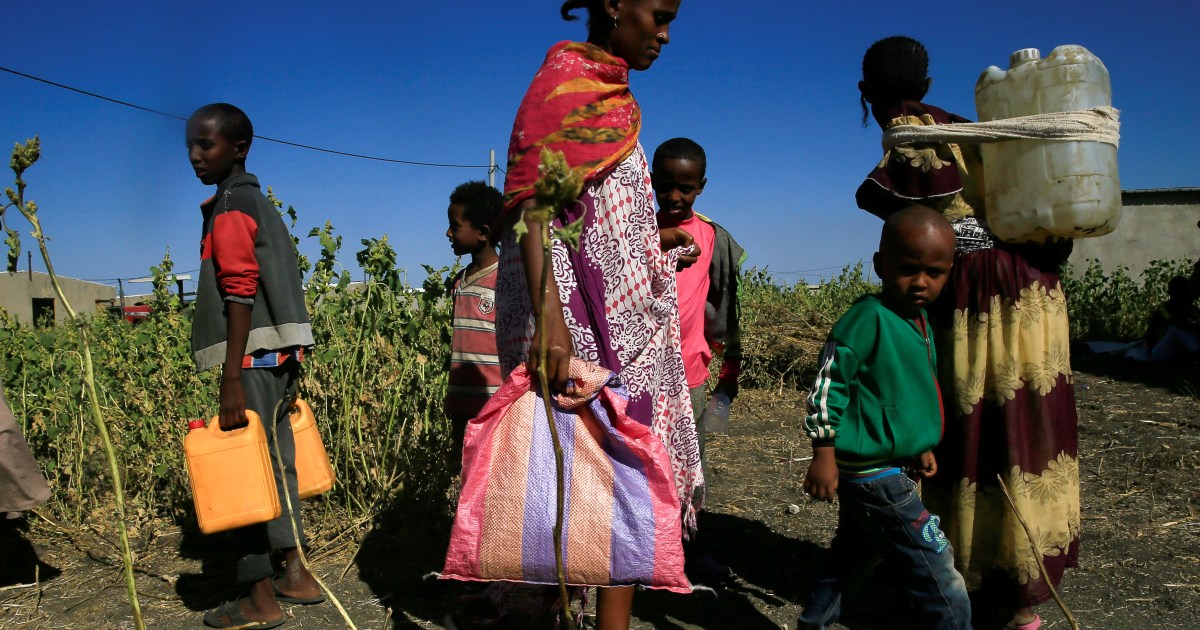Media reports stated that at least 4 rockets were fired at Eritrea from Tigray, where it is likely that the Tigray People's Liberation Front (PFLT) launched them, while the Front has not claimed responsibility for the missile attack.
Eritrean media reported that the rockets landed near residential areas in the capital Asmara, in addition to the towns of Dekhemhari, Jamihalu and Nafaset.
There were no reports of injuries.
And two weeks ago, Départition Gebrima Michael, leader of the Tigray region, announced the targeting of the Eritrean capital with missiles.
The French Press Agency quoted 4 diplomats as confirming the second attack of its kind since the outbreak of fighting on Ethiopian lands this month.
One of the diplomats said, "A missile was fired from the Tigray region, apparently in southern Asmara," noting that there was no information about casualties or damage.
The Popular Front for the Liberation of Tigrayans has previously accused Abiy Ahmed's government of bringing in military support from Eritrea, which Addis Ababa denies.
And since November 4, armed confrontations between the Ethiopian Federal Army and this front have continued.
The Popular Front dominated political life in Ethiopia for about 3 decades, before Ahmed came to power in 2018, becoming the first prime minister of the Oromo ethnicity in the country, which numbered about 108 million people.
He refused to dialogue
These developments coincided with the Ethiopian Prime Minister informing the delegates of the African Union of his intention to continue the military operations in the Tigray region, rejecting calls for dialogue, at a time when his army was preparing for the final phase of the attack on the region.
On Thursday, Nobel Peace Prize winner Ahmed announced the start of the "third and final phase" of his military campaign against the Tigray People's Liberation Front.
For more than 3 weeks, the two sides have been fighting fierce battles, and the International Crisis Group said that it had caused thousands of deaths, "including many civilians and security forces."
Fears are about the fate of the half a million people who live in Mekele, the capital of Tigray province, which the army says is besieging it and threatening to attack it.
For their part, international leaders and human rights organizations warned that such an attack would constitute a violation of the rules of war, calling for urgent mediation.
And Francesco Pope, the Vatican, expressed his concern about the raging battles and the increasing number of deaths and displaced persons, according to Matteo Bruni, Vatican media official.
For its part, Addis Ababa refused to negotiate with the "Popular Front for the Liberation of Tigrayans," and Ahmed considered the calls for a dialogue to represent "interference" in Ethiopia's internal affairs.
Diplomatic moves
On Friday, the Ethiopian Prime Minister received in Addis Ababa 3 former African presidents, Mozambican Joaquim Chissano, Liberian Ellen Johnson Sirleaf and South Africa Kgalema Motlanti, who were sent by the African Union this week to mediate.
In a statement following the meeting, Ahmed expressed his appreciation for "this gesture ... and the unwavering commitment it represents to the principle of solving African-African problems."
But he stressed that his government "is responsible under the constitution for imposing the rule of law in the region and throughout the country."
Ahmed said that failure to impose the rule of law in Tigray "would exacerbate the culture of impunity."
Charges
For their part, the Tigray authorities reported that the government army was bombing towns and villages, causing great damage, but without mentioning Mikeli in particular.
"Our struggle will continue from all sides until the Tigrayans guarantee the right to self-determination and the exit of the invading forces," she said in a statement broadcast by the local Tigray TV.
On his part, United Nations Secretary-General Antonio Guterres called on Friday, in a statement, the parties to the conflict in Ethiopia to "seize the vital opportunity" for African mediation to "resolve the conflict peacefully."
Communication with Tigray has been cut off since the fighting began, making it difficult to verify the conflicting announcements about the victims and who controlled the various areas.
The same general conflict erupted in which the African Union, which includes 55 countries and is based in Addis Ababa, decided to play a greater role in resolving the continent's conflicts under the slogan "Silencing the Arms."
A humanitarian crisis
The possibility of a large-scale attack led to an intensification of diplomatic efforts this week to resolve the conflict, as the UN Security Council held its first meeting on Tigray, while US and European officials called for restraint.
French Foreign Minister Jean-Yves Le Drian - who met his Ethiopian counterpart Demiky Mekonnen in Paris, on Thursday, called for urgent steps to be taken to protect civilians, in light of the worsening humanitarian repercussions of the crisis at the regional level.
On the other hand, the United Nations High Commissioner for Refugees said Friday that about 100,000 Eritrean refugees in Tigray face the risk of running out of food by Monday if supplies do not arrive.
As for eastern Sudan, where more than 40,000 refugees have arrived, fleeing the fighting in Tigray, local authorities are trying hard to provide for the growing needs for food, shelter and other essentials.

